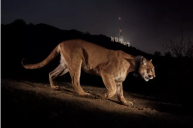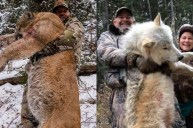Last week, a Tennessee congressman filed a measure to ban "killing contests" of wildlife on federal lands. As the name implies, the "Prohibit Wildlife Killing Contests Act" would stop the practice of rewarding hunters for killing the most or largest predator or other animals deemed sport.
When Rep. Steve Cohen filed the bill, he described the practice as "both cruel and unnecessary" as it serves "no legitimate wildlife-management purpose." He added that "America's wildlife play a special role in the natural environment and in a healthy ecosystem."
Dozens of animal rights and wildlife groups applauded the new bill. Johanna Hamburger, a representative for the Animal Welfare Institute, argued that killing contests go against ethical hunting. She said participants lure animals in with bait and electronic calling devices and then dump their carcasses after the contest. She said they have "no place in modern civil society."
What are Killing Contests?
According to the Humane Society, the term "killing contests" covers a range of activities, including dogfighting and cockfighting. But contests typically target animals like coyotes, bobcats, prairie dogs, foxes, and in some states mountain lions and wolves.
Additionally, critics say the indiscriminate killing of such wildlife often creates an imbalance in an ecosystem. In some cases, young animals that depend on their parents starve or die from exposure. While in other cases, like with coyotes, populations can increase as more animals begin to reproduce or migrate into an area.
In the past, supporters of killing contests argued that they helped reduce the depredation of livestock, especially out west. Also, wildlife advocates often point to Wyoming as an extreme example for killing contests. Under state law, you can hunt and kill most predators year-round by any means and without limit or license.
Earlier this year, Wyoming's lack of regulation led to global outrage when a resident injured a wolf with a snowmobile, tortured it, and then killed it. Even though state officials condemned the man's actions, authorities could not punish him beyond a $250 fine. It also failed to amount to any legislative changes.
Yet, ten states have banned killing contests. However, it's unclear exactly how authorities would enforce the new prohibition as the bill's text has not been released. While agencies that manage public land do allow hunting in specific areas, states typically coordinate hunting activities, even on federal land.
Since the bill was filed on May 22, it has gained 16 co-sponsors, all of which are fellow Democrats, and it's been sent to the House Natural Resources Committee for review. If passed, it would go into effect one year from the day it receives the president's signature.




